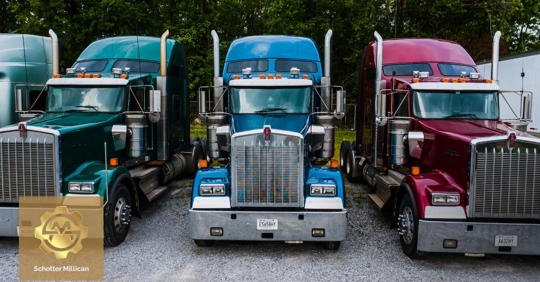Understanding Legal Liability in Truck Accidents
Imagine being caught in a moment where everything changes in the blink of an eye. Truck accidents involve not just crushed metal but also crushed confidence, unclear next steps, and a maze of legal complexities. When grappling with these challenges, understanding how the law assigns fault and how liability works becomes your first step toward rebuilding what was lost.
Determining Fault in Truck Accidents
Deciding who’s at fault after a truck accident can feel like piecing together a massive puzzle. Key factors often include driver behavior, mechanical issues, and even the conditions of the road. Police reports act as a first snapshot, offering initial facts about the crash. Eyewitnesses might fill in some gaps by sharing what they saw, while records like truck maintenance logs might reveal underlying issues with the vehicle.
One important piece of the puzzle is understanding how fault can be shared. States that use a "comparative fault" system divide responsibility between parties. For example, if you’re found 20% to blame for the accident, your compensation might be reduced by that percentage. It’s a complex yet essential concept that can shape everything from settlement offers to final outcomes.
Role of Trucking Companies in Liability
It’s not just about the truck driver. Trucking companies often share responsibility thanks to their role in overseeing vehicles and drivers. If poor training or neglected vehicle upkeep caused the crash, the company could bear a significant share of liability. There’s also the concept of "vicarious liability," which holds employers accountable for accidents caused by their employees during job-related tasks.
For instance, if a driver causes a collision while delivering goods, the trucking company might be financially responsible. This broader reach of liability ensures injured parties can seek restitution from multiple sources, but it also underlines the need to hold companies accountable for upholding safety standards.
Insurance Coverage in Truck Accidents
Insurance is supposed to provide relief, but getting there is rarely simple. Truck drivers and their employers generally carry multiple insurance policies, such as liability coverage or personal injury protection. Theoretically, these policies are designed to cover medical bills, property damage, and more.
Unfortunately, insurance companies aren’t always on your side. Their goal often revolves around minimizing payouts, which might mean disputing the severity of your injuries or playing down liability. Filing a claim can quickly turn into a negotiation battle, so staying informed is vital. Know your rights, be cautious about what you share with insurance adjusters, and don’t be afraid to seek legal support if the process feels overwhelming.
Workers' Compensation for Drivers in Truck Accidents
Who Qualifies for Workers' Compensation?
Truck drivers injured on the job may have access to workers’ compensation, but this hinges on employment status. If you’re an employee, you’re generally entitled to medical coverage and partial wage replacement. Independent contractors, however, typically don’t qualify and must explore other avenues, such as personal injury claims, to recover costs.
That said, workers’ compensation and personal injury claims serve different purposes. Workers’ compensation is no-fault, meaning it pays out regardless of who caused the accident. Conversely, a personal injury claim could offer greater compensation if someone else’s negligence caused your injuries, but it requires proving fault. Knowing how to balance these options is key for protecting your rights and financial stability.
Steps to File a Workers' Compensation Claim
Filing for workers’ compensation starts with informing your employer about the accident right away. Seeking medical care immediately is just as critical—for your health, but also to document injuries properly. From there, you’ll need to provide comprehensive documentation, including medical reports and accident details.
Mistakes, like misunderstanding eligibility rules or missing deadlines, can delay or even derail your claim. This is where having knowledgeable guidance can make all the difference. Whether it’s understanding complex paperwork or meeting specific timelines, having clarity in this process protects you from unnecessary stress and ensures you get the benefits you deserve.
Comparing Workers' Comp and Personal Injury Claims
Deciding between workers’ compensation and a personal injury claim often comes down to weighing your short- and long-term needs. Workers’ comp provides immediate relief for medical bills and partial wages, but doesn’t cover things like pain and suffering. On the flip side, personal injury lawsuits might help address these broader damages, but they require time and evidence to prove negligence.
Some drivers pursue both claims concurrently. However, this can introduce complications. For example, funds recovered through a lawsuit might need to reimburse your workers’ comp insurer, in what’s known as subrogation. Navigating these complexities often requires a solid legal strategy to maximize compensation without unnecessary setbacks.
Legal Guidance to Steer You Forward
Why Legal Representation Matters
Dealing with the aftermath of a truck accident can involve juggling insurance disputes, filing claims, and potentially facing legal judgments. Having someone knowledgeable by your side can make navigating this complicated process less overwhelming. Skilled attorneys can break down legal jargon, negotiate with insurers, and assist with building a strong case based on evidence, like truck maintenance records or accident reconstructions.
When hiring an attorney, prioritize finding someone with experience handling truck accident cases. Even more importantly, choose someone who is approachable and understands the stakes involved. With proper representation, you can focus on recovery while someone else ensures your legal rights are protected.
Next Moves Toward Justice
Truck accidents leave lasting impacts, but knowing the right steps can make all the difference. From gathering evidence at the scene to handling insurance adjusters, preparation and strategy go a long way. If settlement talks stall, having the foresight to prepare for potential litigation puts you in the best position to pursue fair compensation.
The legal hurdles might seem insurmountable for those involved in truck accidents in the Brooklyn, NY area, but they don’t have to be tackled alone. At Schotter Millican, LLP, we’ve dedicated ourselves to helping individuals like you get the compensation they need to move forward.
Call (718) 550-0610 today for a consultation and take the first step toward reclaiming your future.

